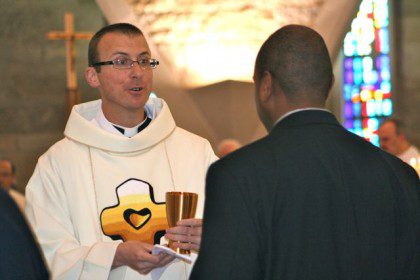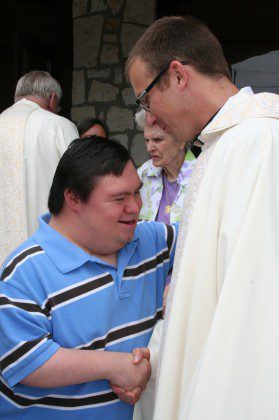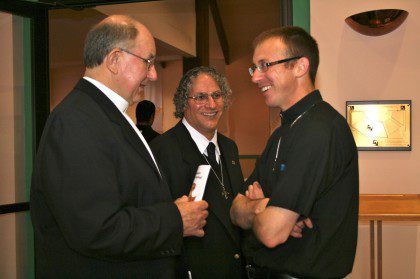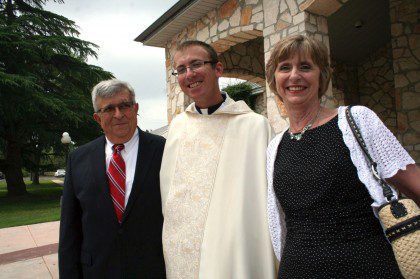
Something was different
Fr. Greg Schill says that even as a child he had a sense that he was experiencing the world differently than others.
With a laser beam focus of attention he often became obsessed with a single object or concern while not even seeing that which might be right in front of his eyes.
“By the time I completed the second grade I had all of the U.S. presidents memorized in numerical order, alphabetical order, and their place of birth, their date of birth and their date of death,” said Fr. Greg.
Obsessed with geography, when he was in the third grade he could identify any country on the map.
History and geography were within that laser beam of focus, but English?
“I got a ‘D,’” he said. “I had the lowest reading comprehension scores in my class.”
It didn’t make sense to Fr. Greg’s family. Seemingly brilliant in some areas the young Greg was totally non-comprehending in others. It went beyond the typical student who has more aptitude for some subjects than others.
“I would become extraordinarily focused sometimes, so focused that I would only see what was 50 yards ahead as opposed to what was right in front of me – metaphorically and literally,” said Fr. Greg.
History and geography fell within that long-range focus. But English?
“It just wasn’t there,” he said.
Frustration
Growing up, Fr. Greg continued to sense that he was different than his peers. Often, he felt frustrated and embarrassed because he just didn’t understand things the ways others did. Daydreams became a way of coping with a reality that was often incomprehensible to him, something that distanced him even more from the world around him.

“Getting caught up in daydreams meant that I often missed what was close at hand,” said Fr. Greg. “And sometimes, that meant that I hurt people’s feelings, or at least left people feeling confused about my reaction to a situation.”
But even with the challenges that faced him, Fr. Greg went on to serve in the Marine Corps and earn a degree in political science before pursuing his vocation with the Priests of the Sacred Heart.
Throughout formation he received high marks for much of his work and his dedication to ministry. He was named “Volunteer of the Year,” at Chicago Lighthouse, a non-profit organization that assists the visually impaired.
However, his formation directors noticed that as dedicated as Greg was, there was sometimes a significant disconnect in his relations with others.
Familiar with Asperger’s, a condition related to autism, a member of the formation team wondered if Greg might have a form of the syndrome. He was asked to go for a diagnosis.
“I was not happy when I was told about this,” said Fr. Greg. “I resisted it at first but then realized that it would be good for me and the community to get some answers.”
The formation director’s hunch was correct; in 2009 Fr. Greg was indeed diagnosed with Asperger’s.
Still in temporary vows, Fr. Greg worried that the diagnosis would affect his ability to move forward toward final vows and ordination.
“However, that was not the case,” he said. “The formation team was behind me, as was the provincial administration. They were proactive with me throughout the process as I learned what I needed to do to modify certain behaviors to compensate for the Asperger’s
“The advantage of having the diagnosis is that now I know why I have been ‘different,’ and knowing that, I can be a better minister and a better community member.”

Acceptance
As Fr. Greg learned more about Asperger’s he gained an increased acceptance of it. He sometimes refers to himself as an “Auspie,” and notes many famous figures from history who are suspected of having had the syndrome, including Sir Issac Newton, Albert Einstein and Thomas Edison. Many of the World War II code-breakers were thought to have had Asperger’s as well. Their incredible focus and dedication allowed them to sort through and find connections in massive amounts of data.
It’s an example seeing a difference not as an oddity but as a blessing and tool
Diagnosis, said Fr. Greg, opened a window that gave him an insight into who he is and how he functions. And now that he has that insight he can find ways to refocus the laser beam, or to compensate in areas such as interpersonal communications.
Related to that, Fr. Greg talked about a common misperception that many have regarding Autism and empathy.
“There is a misperception that a person with autism, especially on the Asperger’s scale, has no empathy and is cold when hearing sad news or news that a friend needs emotional support,” said Fr. Greg. “The truth is that often a person with Asperger’s experiences a delay in fully registering what it is that he is hearing so sadness and empathy are often delayed. It is not that the emotions are not there, they just don’t come forward immediately.
“As a priest, I try to work around this hidden disability by asking questions of a person who is experiencing grief,” he said. “I ask how the person is feeling and note the difficulty of the situation so he knows that I am walking with him.”
Fr. Greg said that it in some ways it is like being an actor. “But I am not being disingenuous,” he emphasized. Instead, he is giving appropriate external responses while allowing his mind and emotions to catch up and fully process what was heard.

Advocacy
Since his diagnosis, Fr. Greg has worked hard to develop the tools to both compensate for and utilize the byproducts of Asperger’s. Now, he tries to help others do the same through education and advocacy.
“I attempt to help parents navigate the system to locate the services that are suitable for their child’s needs,” he said. “I also encourage parents to teach their children how to advocate for themselves, something which is vital as the child grows older.”
When heading to college, those with Asperger’s need to let roommates, fellow students, staff and educators know of their syndrome and of some of the “oddities” associated with it. The same is true when the person with Asperger’s enters the workforce.
“Often a person who has Asperger’s gets fired simply because of a miscommunication that can lead to misunderstanding,” said Fr. Greg.
As in any situation, good communication makes things work better. Knowing why someone acts as s/he does goes a long way to dispelling conflict and frustration.
“Being aware of those who are different is a stepping stone for strengthening our relationships with one another,” said Fr. Greg. “Accepting one another for who we are is essential in building the relationships that make the world a better place.
“In the words of Fr. Dehon, our founder, it is the path that leads to reconciliation.”
Fr. Greg is a member of the Sacred Heart Southern Missions pastoral team that serves the Mississippi parishes of Christ the King in Southaven, Queen of Peace in Olive Branch, Holy Spirit in Hernando, Good Shepherd in Robinsonville, and St, Gregory in Senatobia.
